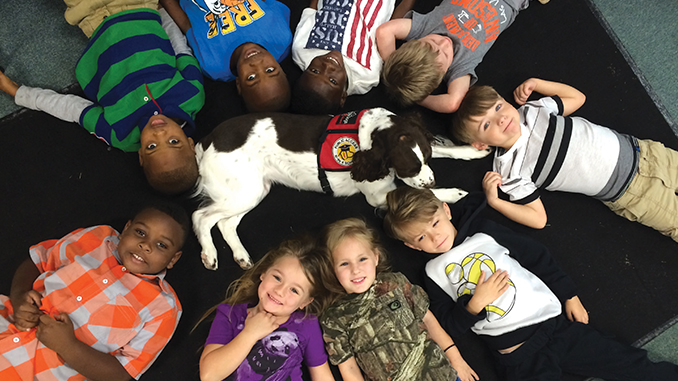
Reentering schools with trained intervention dogs.
Published: August 31, 2020
By: Courtesy of Service Dogs Alabama
Service Dogs Alabama has a contract with the Alabama State Board of Education to supply fully-trained Facility Intervention Dogs to Alabama public schools.
These “school dogs” are trained to recognize a vulnerable student and intervene with non-disruptive behaviors which include nudging, head snuggle in the lap, or compression to the student’s feet or legs.
These specialized dogs are trained to work off-leash on their own as well as to take direction from the teacher to comfort a student or prevent a meltdown. They are utilized to disrupt behaviors before they can escalate, maintain order in the classroom, and promote inclusion and participation.
Re-entering the schools this year will be a challenge to all, however, this challenge will be much less stressful with the assistance of a trained intervention dog because the dog will be allowed to have personal and intimate contact with the students and faculty in the schools. The dog eases the trauma of isolation and the perception of exclusion (by distancing) for students who are already struggling with the need for peer and adult acceptance and inclusion.
According to child psychologists, children are especially vulnerable to abuse during the pandemic due to increased stress levels among parents and operational changes that have led to many child abuse and neglect reporting inaccuracies. To add to the tension, children are also experiencing their own stress and uncertainty about the pandemic. There have been concerns that incidents of stigmatization and bullying may increase when children return to school, due to some of the misinformation around COVID-19.
Research has already indicated that dogs can impact school performance by reducing stress and increasing motivation, focus, and task persistence. In addition to academic performance, emotional and behavioral impacts are achieved. Studies show that professionally trained dogs in a classroom can decrease anxiety and depression, while increasing self-esteem, expression of feelings, and the ability to trust. A 2013 study determined that students exhibited fewer problem behaviors such as aggression and hyperactivity when a dog was placed in the classroom.
Service Dogs Alabama understands that Facility Intervention Dogs will be needed this year more than ever. However, as schools reopen, there are guidelines that should be followed to keep everyone safe.
SDA recommendations:
- Follow all guidelines provided by your state and your school.
- Sanitize your hands and your student’s hands frequently when interacting with the dog.
- The top of the dog’s coat will be cleaned with a Baby Wipe throughout each day (it will not kill COVID but will keep the dog clean). No chemicals, alcohol, or disinfectant will be used on the dog.
- Dogs should wear collars and leashes that can be disinfected.
- The dog will be allowed to “visit” and be petted when everyone is seated. This will encourage social distancing and cooperation.
